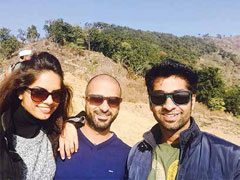
Swaminathan Iyer has always been a globetrotter but he has his heart set on Australia; one of the primary reasons he is trading his Indian citizenship for an Australian one. More on his experience on working in the land of Kangaroos...
“I work as a solutions architect for an IT major in Australia. I first came to this country in the year 2008 after finishing my Bachelors (Engineering) in India for a two-year Master’s program. I left Australia after completing my Masters in the year 2010 in pursuit of employment opportunities in India and Singapore. Finding a job as an immigrant graduate without a Permanent Residency during those times was difficult. After acquiring about three years of experience, I decided to migrate to Melbourne on a Permanent Residency Visa in the year 2014”, Swami explains.

The techie talks about the work ethic and culture prevalent in Australia:
Punctuality: Although it varies with profession, people are generally punctual. Lesser traffic on roads, ease of public transport are some of the contributing factors.
Workload: This too varies with the profession but given my experience in the IT industry, it is largely seasonal. Workload tends to come down as the year closes (say, November, December).
Competition: Melbourne and Sydney are global hotspots hence competition for jobs is often fierce even for someone coming in with specialist skills. Good English, relevant experience and a professional outlook amongst others are a deal breaker when it comes to securing an employment offer.
Melbourne and Sydney are global hotspots hence competition for jobs is often fierce even for someone coming in with specialist skills. Good English, relevant experience and a professional outlook amongst others are a deal breaker when it comes to securing an employment offer

Dress culture: People are expected to dress professionally and be presentable at work. Most of the large firms have a corporate culture in place. Most of the companies allow their employees to wear casual clothing on Fridays.
Work from home and overtime: A lot of firms permit flexible work practices, allowing their employees to work from home. If the nature of the role involves you to be in a specific work location, you are not expected to stay in office beyond your scheduled time. Any overtime is usually compensated for. This, however, can naturally vary as per one's profession and role.
Appreciation: This is very specific to the kind of people you get to work with and the attitude of the team in general. But if you have done a good job, appreciation is quick to come by in word or otherwise.
Incentives and pay cheque: Australian pay is generally good and is protected by good labour laws. It allows one to lead a very decent quality of life even though the cost of living is expensive. I find the incentives in Australian firms far superior in comparison to India. Apart from the standard incentives like health insurance, a lot of employers provide car allowance depending on your role and function.

Career prospects: As with any new place, it is generally hard to make inroads for any immigrant when you are new but as you spend more time and develop professional relationships, career prospects open up both internally and externally.
“The coffee culture is big in Australia and a lot of people find jobs while meeting hiring managers over a cup of coffee.”
Politics at work: This really depends on the team, your boss and you as an individual.
Relationship with boss: Again, it depends on who you are as an individual and who you get to work for. When it comes to work, good bosses are generally very professional and accommodating. Also, employee labour laws are very strong in Australia and any abuse of authority can quickly work against the supervisor.

“I intend to work in Australia for another couple of years. Apart from the obvious, high quality of life that I am able to lead, Australia is usually at the leading edge compared to a lot of other countries in terms of early technology adoption. Acquiring some good experience here and then taking this experience to an emerging economy like India would be more fruitful from a career standpoint in the longer run”, says Swami.
Swami signs off by expressing his love for the Aussie culture, “I feel part of the country that is diverse and progressive and very immigrant friendly in general. You have people from many ethnic backgrounds embracing Australian Citizenship. In short, I feel like I am a Global Citizen, citizenship which is not indicative of your race or cultural background!”
by Namrata Gulati Sapra